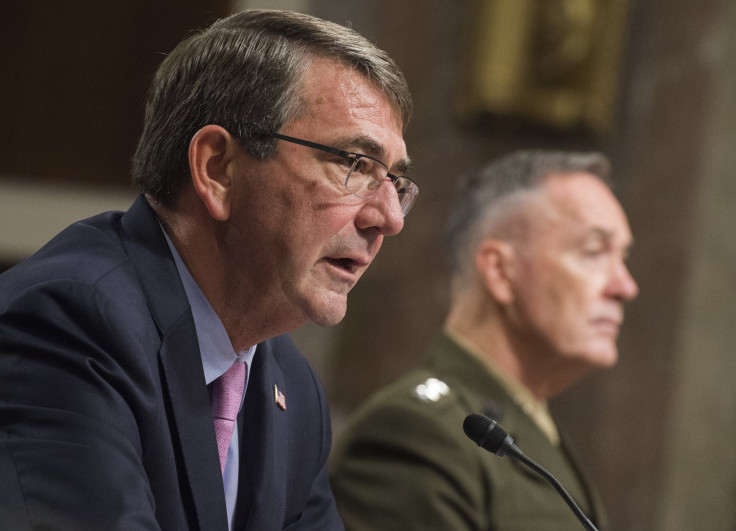US Defense Secretary Ash Carter States Changing 'Operational Posture' With Russia, Continued Exercises In South China Sea

Facing “aggression” from Russia, the United States is shifting its “operational posture” better to protect itself and its allies, Secretary of Defense Ash Carter said Saturday. Speaking at the Ronald Reagan Presidential Library in Simi Valley, California, Carter said Russia’s “challenging activities” and evolving behavior made it a growing threat to world order, Stars and Stripes reported.
"We do not seek a cold, let alone a hot, war with Russia," he said. "We do not seek to make Russia an enemy. But make no mistake; the United States will defend our interests, our allies, the principled international order, and the positive future it affords us all."
Without saying so, Carter appeared to be referring to Moscow’s seizure of Crimea last year, its support of separatist rebels in eastern Ukraine and recent airstrikes in Syria in support of the Bashar Assad regime. The defense secretary said he was especially concerned by reports that Russia has been testing nuclear missiles in violation of arms control treaties
In response, Carter confirmed, the U.S. is improving weaponry in such sectors as drones, lasers, railgun projectile launchers and bombers, Agence France-Presse reported. The Pentagon also is “leveraging other U.S. government capabilities to include information campaigns -- to ensure the truth gets through -- and focused sanctions, which have had an impact on Russia,” he added.
Carter also took note of China, which he warned could present challenges for international order should it continue to militarize disputed territories in the South China Sea. Reuters reported Carter announced the U.S. Navy would carry out more "freedom of navigation operations" by sailing close to Chinese installations, as was done a few weeks ago. In October, a U.S. guided-missile destroyer, the USS Lassen, challenged territorial limits around one of China's man-made islands in the Spratly archipelago.
“How China behaves will be the true test of its commitment to peace and security," Carter said. "This is why nations across the region are watching China's actions in areas like the maritime domain and cyberspace."
Don't believe me just watch... US #Defense Sec Ash #Carter aboard carrier #ROOSEVELT in South #China Sea today. pic.twitter.com/0t2sPJbKuY
— Chris Cavas (@CavasShips) November 5, 2015For his part, Chinese President Xi Jinping this week repeated the claim that the Spratly Islands in the sea “have been China’s territory since ancient times.” He called for other nations -- like the U.S. -- to respect the need for a peaceful environment, the New York Times reported.
“Freedom of navigation and aviation has never been a problem and will never be a problem in the future, because first of all China is the one who most needs smooth navigation,” Xi said.
© Copyright IBTimes 2025. All rights reserved.






















